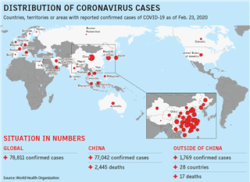By Claire Wilkinson
As the March issue of Business Insurance goes to press, the coronavirus outbreak continues to spread to new countries, with growing numbers sick from the virus and a global death toll that is also rising. While the majority of the cases are in China, where the virus originated, countries including South Korea, Japan, Italy, Singapore, Iran, the United Kingdom and the United States have reported confirmed cases, and varying internal responses are in place from quarantines to travel restrictions and lockdowns.
The broadening economic impact of the virus has affected airlines, cruise lines, manufacturing plants, retailers, hospitality chains, event organizers and transportation companies, among others.
U.S. businesses including Procter & Gamble Co., Apple Inc., Coca-Cola Co. and Starbucks Corp. have all warned of profit declines due to the fallout from the virus. For example, recent comments from Jon Moeller, vice chairman, chief operating officer and chief financial officer of Procter & Gamble, at a Feb. 20 conference in New York highlighted the extent of the supply chain risk and exposures that multinational companies face.
“We access 387 suppliers in China that ship to us globally more than 9,000 different materials, impacting approximately 17,600 different finished product items. Each of these suppliers faces their own challenges in resuming operations. The operating challenges change with the hour, and of course the path of the virus is unknown, making it very difficult to provide precise estimates of impact,” Mr. Moeller said.
Procter & Gamble’s results for the January to March quarter in China and for the total company “will be materially impacted on both the top and bottom line by these dynamics,” he said.
Apple also warned in February that its worldwide iPhone supply will be “temporarily constrained” as its manufacturing partner sites in China are ramping up “more slowly” than anticipated. “These iPhone supply shortages will temporarily affect revenues worldwide,” the company said.
As we continue to cover the story, the word from insurance brokers and others is that most supply chain-related losses for U.S. companies will likely not be covered by business interruption or contingent business interruption policies, because in general both require physical damage for coverage to be triggered.
However, there are nuances in coverage, so for example civil authority provisions in insurance policies may provide coverage for a business interruption loss if a government entity denies access to a covered property.
Coverage under contingent business interruption policies may also be in play, though that would depend on individual policy language, according to industry experts. Policyholders should be checking their policies and providing notice to insurers if they think they have a valid claim, they said.
Perhaps one of the most obvious early takeaways for risk managers and their companies is the importance of having a backup plan and the ability to be nimble during an event. Given all the variables and unknowns surrounding this virus, that is easier said than done, but in the case of companies with a concentration of manufacturing plants and/or suppliers in one part of the world, there’s clearly a problem.
Business practices and supply chains are not going to change overnight and global production systems have so many advantages that this is clearly a risk that needs to be mitigated and where possible transferred rather than avoided.



